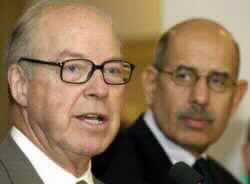Iraq vowed on Tuesday to meet a U.N. December 8 deadline to produce a full account of its weapons programme and said the world body's inspectors would be given complete access to all sites. "Within 30 days, as the (U.N.) resolution says, a report from Iraq will be submitted on all the files -- nuclear, chemical, biological and missile files," President Saddam Hussein's adviser General Amir al-Saadi told reporters.
Under a U.N. Security Council resolution adopted on November 8, the first big test is the December 8 deadline for Iraq to submit a full account of all banned weapons programmes. By January 27 the inspectors must have given their first report to the Security Council.
The United States has accused Baghdad of possessing weapons of mass destruction and has threatened to launch a war against Iraq if it does not disarm.
Mohamed ElBaradei, head of the International Atomic Energy Agency, said he had been given assurances by Saadi and Iraq's Foreign Minister Naji Sabri that Baghdad would meet the December 8 deadline.
ElBaradei and chief U.N. weapons inspector Hans Blix returned to Baghdad on Monday with an advance team of 30 experts after a four-year break in U.N. arms monitoring in Iraq.
BAGHDAD PROMISES U.N. FULL ACCESS
Asked if the inspectors would have unfettered access to all sites in Iraq, Saadi said: "Yes, that is as stipulated in the resolution and as we have agreed with them."
Blix described the talks as constructive and said they had agreed on many practical arrangements and had produced a mechanism to resolve problems that may arise in the future.
As inspectors dusted out old offices, U.N. Secretary-General Kofi Annan said Iraq's firing on U.S. and British aircraft enforcing "no-fly" zones over northern and southern parts of the country did not violate the U.N. resolution -- contrary to a U.S. interpretation.
The day after the return of weapons inspectors, the Iraqi media again accused the United States of plotting to go to war against Baghdad.
U.S. President George W. Bush arrived in Prague for a NATO summit where he will seek political support for his hardline policy against Iraq, although he has signalled that he will make no request for military help from the 19-nation bloc.
Bush has said the inspections, on the tough terms set out in Security Council resolution 1441, are Baghdad's last chance to abandon peacefully its alleged chemical, biological and nuclear arms programmes.
DIFFERING U.S. AND U.N. VIEWS
Washington says that Iraqi fire on U.S. and British aircraft -- a frequent event -- is a breach of U.N. provisions. But on Tuesday, U.S. State Department spokesman Philip Reeker said: "We're not looking for triggers. We are looking for Iraqi compliance and disarmament. And we'll continue watching that very closely in coming days."
Annan, speaking in the Kosovo capital Pristina, told reporters: "Let me say that I don't think that the Council will say this is in contravention of the resolution of the Security Council."
Key Security Council member Russia also said the U.S. argument had "no legal grounds", but France urged Iraq to avoid "any act...that could accentuate tensions".
In London, a Foreign Office source reaffirmed that Britain sought other justifications under international law for the zones, but the new resolution was not one of them.
In the latest incident, U.S. and British warplanes raided Iraqi air defences on Monday. The no-fly zones were set up after the 1991 Gulf War that drove Iraqi invasion forces from Kuwait.
Iraq said on Tuesday the attacks had been on civilian targets and that four people had been hurt.
In Baghdad, the inspectors' spokesman Ewen Buchanan said team members were putting the U.N.'s monitoring centre in Baghdad's former Canal Hotel back into action.
The initial inspection team proper, consisting of about a dozen people, is expected to arrive around November 25, with inspections starting two days later. At full strength, there will be some 100 inspectors.
PHOTO CAPTION
Chief U.N. weapons inspector Hans Blix (L) and Mohamed ElBaradei (R), director of the International Atomic Energy Agency, attend a press conference at the U.N. office in Baghdad on November 19. REUTERS/Faleh Kheiber
- Author:
& News Agencies - Section:
WORLD HEADLINES


 Home
Home Discover Islam
Discover Islam Quran Recitations
Quran Recitations Lectures
Lectures
 Fatwa
Fatwa Articles
Articles Fiqh
Fiqh E-Books
E-Books Boys & Girls
Boys & Girls  Women
Women










